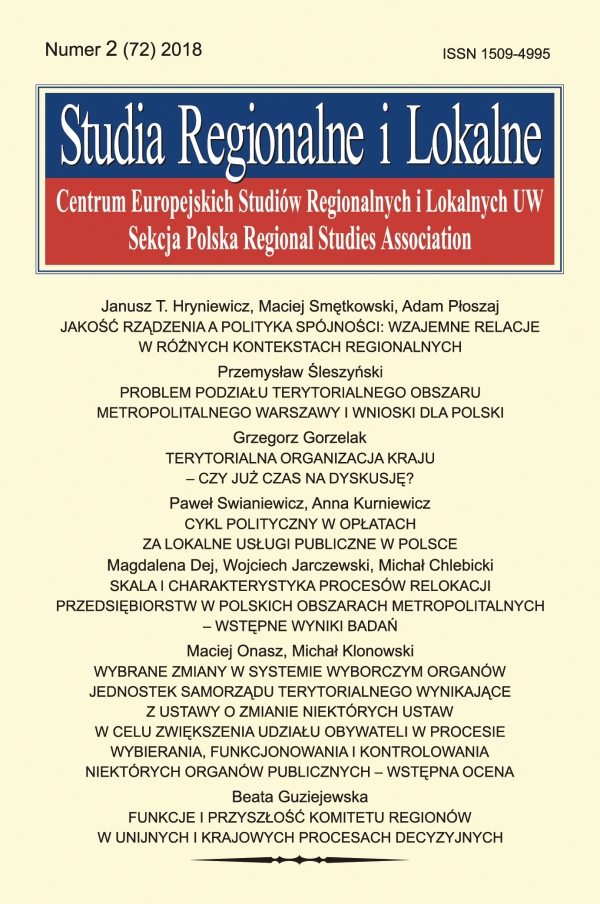Issue:
2(72)/2018
Janusz T. Hryniewicz, Maciej Smętkowski, Adam Płoszaj
The quality of government and the EU cohesion policy: mutual relations in different regional contexts
DOI: 10.7366/1509499527201
Jakość rządzenia a polityka spójności: wzajemne relacje w różnych kontekstach regionalnych
Przedmiotem badań przedstawionych w artykule były wzajemne relacje między jakością rządzenia a wdrażaniem unijnej polityki spójności w różnych kontekstach regionalnych. Badania pokazały dość wyraźne odmienności pod tym względem między regionami realizującymi cel „konwergencja” i regionami, w których obrano za cel „konkurencyjność i zatrudnienie”. Jakość rządzenia pozytywnie wpływała na sprawność w wydawaniu środków UE w obu grupach regionów, choć w regionach realizujących cel „konwergencja” zależność była znacznie silniejsza. Z kolei wielkość napływu środków europejskich sprzyjała poprawie jakości rządzenia, ale tylko w regionach realizujących cel „konwergencja”. W tej grupie regionów zmiany jakości rządzenia miały miejsce bezpośrednio przed i po akcesji do UE, kiedy następował proces adaptacji systemu instytucjonalnego do potrzeb związanych z wdrażaniem polityki spójności. Jakkolwiek następowało zmniejszenie różnic w zakresie jakości rządzenia między dwoma grupami regionów, niemniej badania pokazały, że w regionach celu „konwergencja” potencjalna moc sprawcza środków unijnych skutkująca poprawą jakości rządzenia była dość słabo wykorzystywana.
The quality of government and the EU cohesion policy: mutual relations in different regional contexts
The study focuses on the mutual relations between the quality of government and the implementation of the EU Cohesion Policy in various regional contexts. The research shows quite significant differences in this respect between “convergence-oriented” regions and „competitiveness and employment-oriented” ones. The quality of government has a positive impact on the efficiency of spending of EU funds in both groups of regions, although the dependence is much stronger in the „convergence-oriented” regions. In turn, the scale of EU funds contributes to the improvement of the quality of government, but only in the „convergence-oriented” regions. In this group, changes in the quality of government took place immediately before and after accession to the EU, when the process of adapting the institutional system to the needs related to the implementation of Cohesion Policy occurred. Although the differences in the quality of government between the two groups of regions have decreased, the research shows that in the „convergence-oriented” regions, the potential causative power of EU funds was rather poorly used in this respect.
Affiliation:
Janusz T. Hryniewicz: Uniwersytet Warszawski, Centrum Europejskich Studiów Regionalnych i Lokalnych (EUROREG), ul. Krakowskie Przedmieście 30, 00-927 Wraszawa;
j.hryniewicz@uw.edu.pl Maciej Smętkowski: Uniwersytet Warszawski, Centrum Europejskich Studiów Regionalnych i Lokalnych (EUROREG), ul. Krakowskie Przedmieście 30, 00-927 Wraszawa;
m.smetkowski@uw.edu.pl Adam Płoszaj: Uniwersytet Warszawski, Centrum Europejskich Studiów Regionalnych i Lokalnych (EUROREG), ul. Krakowskie Przedmieście 30, 00-927 Wraszawa;
aploszaj@gmail.com 


